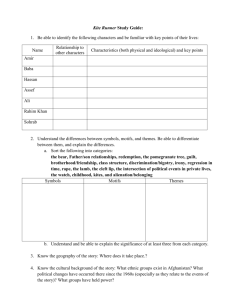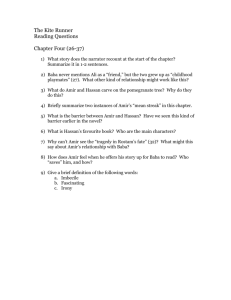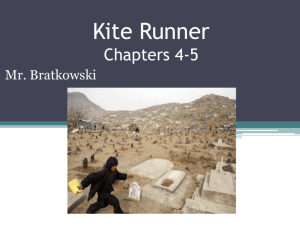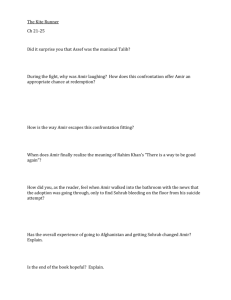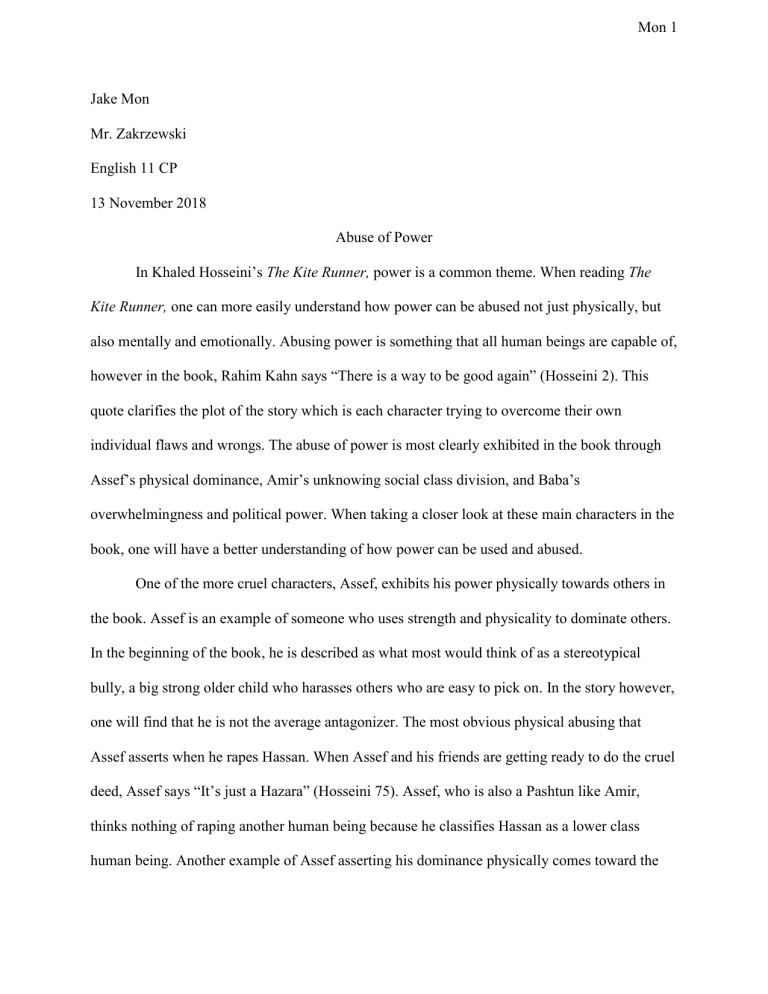
Mon 1 Jake Mon Mr. Zakrzewski English 11 CP 13 November 2018 Abuse of Power In Khaled Hosseini’s The Kite Runner, power is a common theme. When reading The Kite Runner, one can more easily understand how power can be abused not just physically, but also mentally and emotionally. Abusing power is something that all human beings are capable of, however in the book, Rahim Kahn says “There is a way to be good again” (Hosseini 2). This quote clarifies the plot of the story which is each character trying to overcome their own individual flaws and wrongs. The abuse of power is most clearly exhibited in the book through Assef’s physical dominance, Amir’s unknowing social class division, and Baba’s overwhelmingness and political power. When taking a closer look at these main characters in the book, one will have a better understanding of how power can be used and abused. One of the more cruel characters, Assef, exhibits his power physically towards others in the book. Assef is an example of someone who uses strength and physicality to dominate others. In the beginning of the book, he is described as what most would think of as a stereotypical bully, a big strong older child who harasses others who are easy to pick on. In the story however, one will find that he is not the average antagonizer. The most obvious physical abusing that Assef asserts when he rapes Hassan. When Assef and his friends are getting ready to do the cruel deed, Assef says “It’s just a Hazara” (Hosseini 75). Assef, who is also a Pashtun like Amir, thinks nothing of raping another human being because he classifies Hassan as a lower class human being. Another example of Assef asserting his dominance physically comes toward the Mon 2 end of the book when Amir travels to Kabul to find Sohrab. When in Kabul, he sees a Talib guard that looks familiar that ends up being Assef. Assef ends up starting a fight with Amir because he wants to show Amir the control he has over him. In the book Sohrab describes Amir fighting Assef, he screams and cries while yelling “Put it down…Don’t hurt him anymore… Please stop” (Hosseini 290-291). As the quote exhibits, Amir is badly beaten by Assef. One can see how physical power can be abused by someone who is large and has some sense of needing to be in control. Amir, the main character in the book, abuses his power almost unknowingly towards others because of his social class. A clear example of this is when Assef is harassing Hassan. When saying hurtful words to Hassan who is a Hazara, Assef asks why Amir, who is a Pashtun, lets Hassan play with him and talk to him. In the book, Amir says “But he’s not my friend! I almost blurted. He’s my servant!” (Hosseini 41). When saying this, one can see how Amir truly feels about Hassan. Amir thinks of himself as a higher class and better than Hassan because of social class. Although Amir never actually says this, his thoughts describe everything that he feels. The odd thing about Amir saying this is because Amir and Hassan are best friends and they spend almost every day together. These thoughts by Amir are almost uncontrollable because it is so embedded into his mind that it is okay to act like this because Hassan is less than him. Another example of Abuse of power is when Assef sexually assaults Hassan. While Hassan is getting raped, Amir says “I stopped watching, turned away from the alley...I realized something else, I was weeping… I could hear Assef’s quick, rhythmic grunts” (Hosseini 77). This quote exemplifies the idea that Amir was not brave enough to stand up for someone of a lower social class than him, especially his best friend. Amir stood by and watched Assef rape Hassan. Amir is Mon 3 able to get away with this because no one else saw. By not saying anything nor helping, Amir is clearly in the wrong and abuses the power that he has. Baba, Amir’s father, abuses his power by using his size and high social class to get what he wants, but he never verbally threatens anyone. The most obvious abuse of power that Baba exhibits is when he covers up that Hassan is his son. The reason that Baba hides this is because after his first wife passed away, Baba was desperate and had sex with one of his “dancers”. He ends up getting her pregnant. Where the abuse of power comes in is when Baba makes his childhood servant, Ali, father Hassan and take him in as his own. Baba also abuses his power by thinking that Amir is not good enough to be his son. There are many examples of this throughout the book, but the harshest is when he is talking to Rahim Khan and says “He needs someone who… understands him, because God knows I don’t. But something about Amir troubles me in a way I can’t express” (Hosseini 23). This quote mainly shows the poor relationship that Baba has with his son. Baba is unable to relate to him in any way and gives little to no effort in doing so because he thinks he is above it all. Baba exhibits someone has money that wants his life to be a breeze and to have no worries. One can more easily understand how money and political control can lead to corruption and abuse of power. Throughout Khaled Hosseini's The Kite Runner, one is able to have a better understanding of the various ways power can be abused. One can see how through physicality, Assef asserts dominance to Amir and especially Hassan. Through Amir, it can be shown how someone can be abusive without trying to. Finally, one can see how Baba’s money and political power can be used in ways to hurt others and cover up for mistakes that he has made. Overall, each of these characters is able to display a sort of power over others through various ways of harassment and abuse. Mon 4 Focus 18/20 Content 19/20 Support 17/20 Organization 18/20 Conventions & Style 17/20 TOTAL 89/100
